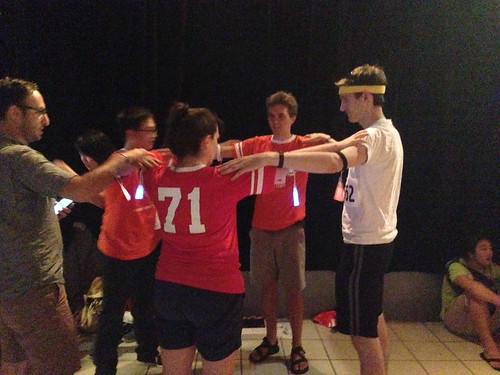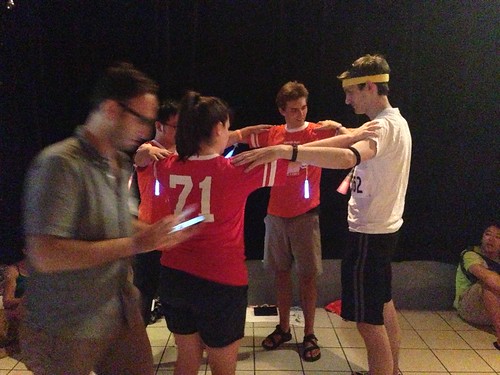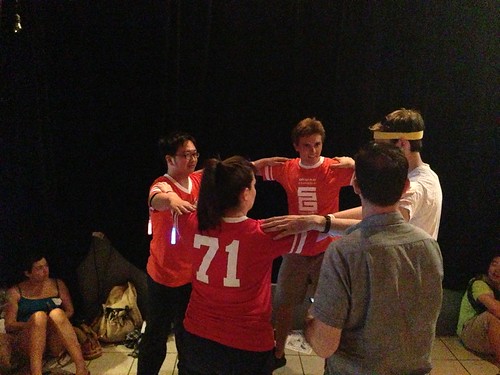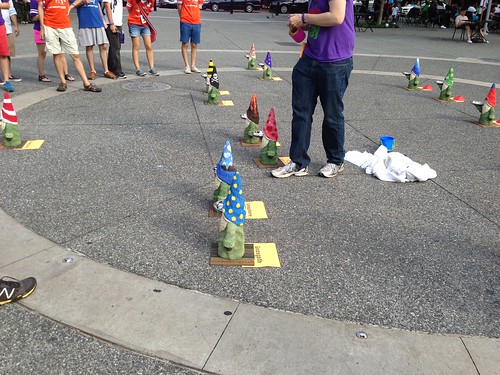I don’t know where I’m posting this so if it’s in a weird place on the site I’ll move it away later.
So there were a couple things I learned from playing games at City of Play. After playing/observing games like Bottleneck, Searchlight, Weenis Wars, and whatever that gnome game was, I understood that:
- Fewer rules or simple rules make games flow better with players unfamiliar with the game. Having too many rules creates a lot of awkward “you’re doing it wrong” “am I doing it wrong” “yes you’re doing it wrong stop” moments. Although games that have complex rules are fun to play and offer more, when you’re introducing your game to people who have no idea what you’re going on about, it’s probably a better idea to have only a few rules to the game. Weenis Wars did a good job with just “don’t move your feet” “grab other people’s weenises” as the rules for the game.
- Don’t assume your players are smart/motivated to play your game. I saw that there were games that required thinking but involved people who couldn’t or didn’t want to, which ended up with a lot of complaining, discomfort, and confusion. Some people just ignore rules or don’t understand how they work, and messes up the entire gameplay for other people. So I guess this means either to 1) only introduce your game to devoted people you know will play it correctly or 2) make your game look interesting enough and debrief the hell out of the players so they know what they are doing and will continue to play as they should. It’s easy for a creator to say “oh, they don’t understand it because they’re stupid” “jesus can you be any stupider” “god why is everybody so dumbbbbb” but in actuality it’s probably the fact that since you made the game you think it’s easy to play (because you know all of the rules, or rather you think you know all of the rules but end up slightly changing them over time to make the game better). We need to understand that people who play a game for the first time each have different experiences with playing games and making a game without considering how players will learn to play it will probably cause unpleasantness when you start to implement it. The problem with the City of Play was that it was mostly impossible to have something like a tutorial and most game creators explained all of the rules at once before letting anyone do anything so when people started to play the game, unless they memorized every word the creator said, they probably don’t know exactly what’s going on.
- Don’t make games that go along the lines of “the louder you are, the easier it is for you to advance in the game” that aren’t games related to sound/music. E.g. Bottleneck required very quick communication between a large group of players, so what people ended up doing was SHOUT WHAT THEY NEEDED ALL THE TIME SO THE ROOM WAS SO FUCKING LOUD YOU CAN’T HEAR YOURSELF THINK. That’s not very nice, is it? I’m sure it depends on the game’s rules that makes this eventually happen, but it would be a good idea to rehearse your game to yourself before you move on to each stage, because a concept always sounds good, but games almost never go the way you want them to when you have random people play it.
I’m sure there are other things I probably learned, but I can’t remember it right now. One thing I did enjoy about the chaos that came with using so many random people to play your game was the social interaction and awkwardness that comes with it. The pure ridiculousness of what the game required people to do made me LOL sometimes. I think when user-created chaos is properly addressed and implemented in games, it can show good results.
Lastly, here are some pictures I took (for bonus, of course):
Weenis Wars
omg a video (http://www.flickr.com/photos/87831442@N04/9650744462/)

Searchlight
Video (http://www.flickr.com/photos/87831442@N04/9650638002/)
[censored]
That’s it!! Thanks for reading!!!!!!







